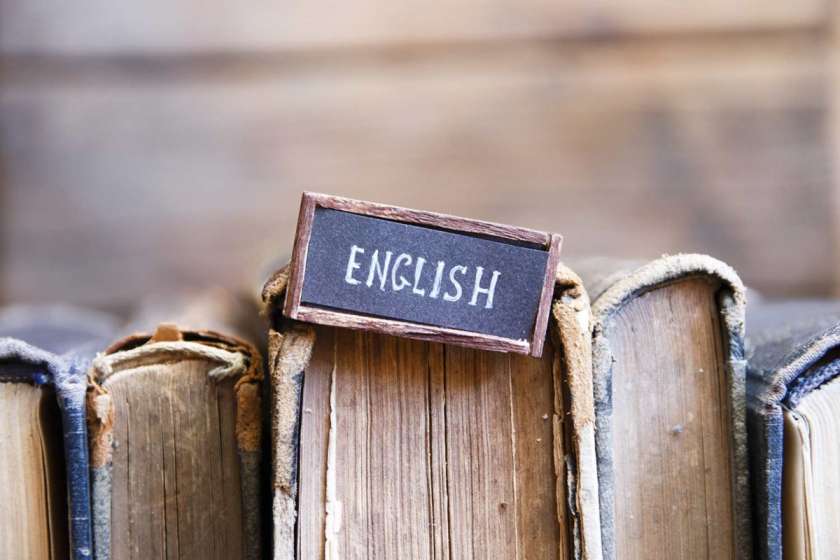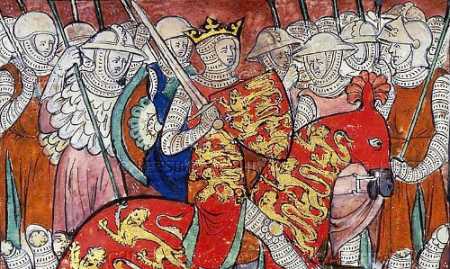Compared to most other languages, English verbs are relatively easy to conjugate. For regular verbs, there are a few simple rules to learn, and you simply have to get to know the odd irregularities of the irregular ones. English spelling, however, is quite mad! Many languages are very phonetic: what you read is what you say; English is most certainly not one of these.
If you are interested in finding out more about the topics covered in this article, be sure to check out the ‘Click here!’ links for more interesting details and fun facts! Also, read to the end to find out why GH-O-T-I spells ‘Fish’.
Why is English Spelling So Mixed Up!
Modern English is a mixture of languages, and this is one reason for the complexity of the English spelling system (and for the simplicity of the English verb and gender systems, which I will write more about in a future post). Another reason for its complex spelling system is that the English language experienced some unexpected changes after its spelling was largely settled.
Before we look at some examples of crazy English spelling, we need to look at some linguistic history to understand how the English language and its spelling became so mixed up.
The Ancient History of the English Language

Like most modern European, Slavic, and Indo-Iranian languages, English evolved from a Proto Indo-European language that was spoken about six thousand years ago by a small group of travelling, horse-keeping people who probably lived North of the Black Sea in the region of present-day Ukraine and southern Russia. These early Indo-Europeans almost certainly did not have a writing system, so they did not have to worry about spelling at all!
Migration Waves
Indo-Europeans seem to have liked moving, and some of them settled in Scandinavia, where a Proto-Germanic language developed from about two-and-a-half thousand to five hundred
years ago, becoming three Germanic language branches (Western, Northern, and Eastern), with a few words borrowed from nearby continental Celts, and some Germanic words loaned to neighbouring Proto Slavs.
About one-and-a-half thousand years ago, some speakers of Western Germanic dialects (Angles, Saxons, Jutes, Frisians, and Franks) moved again, from the North Sea coast, across the English Channel, to settle in what is now England. They pushed back and perhaps absorbed the Romanised Celtic Britons (who became the Welsh people), borrowing very little from Roman Latin or the Celtic languages, so that these Western Germanic dialects became Anglo-Saxon, and then Old English: Hence this earliest form of English was already a blend of, albeit similar, languages. Anglo Saxon gave modern English every-day words like ‘woman’, ‘house’ and ‘loaf’.
Christian missionaries began to arrive, bringing Latin words into the young language, such as ‘martyr’, and ‘font’.
About 1,200 years ago, the North-Germanic Vikings, or Norsemen (North men), came to England from present-day Norway and Denmark, and settled with the Anglo-Saxons. They brought many words (about 1% of modern English) into Old English. These include ‘they’, ‘them’, ‘ransack’, and ‘die’. About a thousand years ago, an Anglo-Saxon and an Old-Norse speaking Viking settler might have quite easily learned to understand each other’s language, since they would have been quite similar. Click here to hear such an imagined conversation in reconstructed Anglo-Saxon Old English and Old Norse!
In 1066, just less than a thousand years ago, William the Conqueror invaded England and brought Norman French to the island. The Normans were more Germanic ‘North men’, but they had lived long enough in Normandy in the north of France to be speaking a dialect of French rather than a Germanic language. The new rulers brought 10,000 words into English, including legal terms such as ‘judge’, ‘jury’, ‘justice’, and ‘evidence’, and words for food, like ‘beef’, ‘pork’, and ‘mutton’; words for the animals from which these foods came remained Germanic: ‘cow’, ‘swine’, ‘sheep’. Middle English had arrived!
After the English won the Hundred-Year War in 1453, French became devalued, and the Early Modern English period began.
English Spelling is Settled
In the 16th Century (the 1500s), Early Modern English spelling began to be settled. About this time, in 1564, William Shakespeare was born.
In 1611, the ‘King James’ or ‘Authorised’ English translation of the Bible was published. Around the same time, Shakespeare’s plays were being written and performed. Shakespeare invented about 2,000 words and phrases, and the new ‘Authorised’ version of the Bible gave many beautiful expressions to the English language. From Shakespeare we get ‘eyeball’ and ‘puppy dog’, and also ‘dauntless’, ‘besmirch’, and ‘lacklustre’, and from the King James Bible we learned to ‘fight the good fight’ [1 Timothy 6:12], that a leopard cannot change its spots [Jeremiah 13:23], and that a soft answer turns away wrath (anger) [Proverbs 15:1].
Shakespeare and the translators of the King James Bible may have to take some of the blame for the craziness of English spelling: There have been no major updates in spelling since Shakespeare’s time, yet there have been many sound changes!
The Great Vowel Shift (and Consonant Disappearance)
As the great works of Shakespeare and the King James Bible were being created, the English language was already in the process of another major transformation, this time for reasons that are not clear. However, perhaps because of the ongoing popularity of Shakespeare’s plays and the beautiful new Bible, English spelling was largely set in stone. Therefore the sound of a word often no longer matched its spelling!
Over a period of about three hundred years, between about 1400 and 1700, a Great Vowel Shift occurred, beginning in southern England. Nobody really knows why, but the pronunciation of all the long vowel sounds in Middle English changed dramatically. Some consonant sounds also changed, especially those that became silent. So Early Modern English came to sound quite different from Middle English, but the spelling was not updated! And students of English now have to live with the consequences!
In Late Middle English, around 1400:
- ‘bite’ [/aɪ/] sounded like ‘beet’ [/iː/]
- ‘meet’ [/iː/] had a vowel sound like the ‘é’ in the French word ‘Pâté’ [/e/] but longer [/e:/], or similar to ‘mate’ in today’s English.
- ‘meat’ [/iː/] sounded a like ‘met’ [/ɛ/], but longer [/ɛ:/]
o The vowel sounds in ‘meet’[/e:/] and ‘meat’[/ɛ:/], and ‘see’[/e:/] and ‘sea’[/ɛ:/] merged into one sound [/iː/]. (Words with ‘ee’ and ‘ea’ in them did not have the same sound in Middle English.)
o Some words were not affected by the ‘meat’-‘meet’ vowel merger, so ‘break’, ‘great’ and ‘steak’ are still pronounced like ‘brake’, ‘grate’ and ‘stake’.
o Also, the vowel sound in ‘bread’, ‘stead’, ‘thread’, and ‘threat’, sounds like that in ‘bred’ due to early shortening, but they all once rhymed with both ‘meat’ and ‘great’.
• ‘mate’ [/eɪ/] sounded a bit like ‘mat’ [/a/], but longer [/aː/], similar to the long ‘a’ in ‘spa’.
• ‘out’ [/aʊ/] rhymed with ‘boot’ [/uː/]
o Some ‘ou’ words’ vowel sound did not shift: for example, ‘soup’, ‘you’ and ‘room’ (which was spelled ‘roum’ in Middle English) still have the vowel sound in ‘boot’ [/uː/].
• ‘boot’ [/uː/] vowel sound was [/oː/], and sounded similar to ‘boat’ [/oʊ/]
• ‘boat’ [/oʊ/] sounded like ‘bought’ [/ɔː/]
• You will notice that some of the Middle English long vowels ‘broke’ and became diphthongs, consisting of two vowel sounds. ([/iː/]→[/aɪ/], [/uː/]→[/aʊ/], [/ɔː/]→[/oʊ/])
• The silent ‘e’ at the end of many Modern English words was once pronounced, before becoming a lazy ‘schwa’ [/ə/] sound, and then disappearing completely
o But the silent ‘e’ usually still makes the middle vowel long
o Also, ‘one’ was once pronounced like ‘own’ and not like ‘won’
• A number of consonants which were once vocalised have become silent, but the spellings of the words still include them.
o The ‘l’ is now silent in ‘walk’, ‘talk’, ‘calm’, ‘folk’, ‘half’, ‘chalk’ and ‘balk’ ▪ but the ‘l’ is still pronounced in ‘bulk’, ‘hulk’, ‘sulk’, ‘silk’, ‘bold’, and ‘bald’
o The ‘k’ is now silent in words like ‘knight’, ‘knife’, ‘knot’, ‘knack’, ‘knacker’, ‘know’, and ‘knowledge’
o The ‘gh’ is now silent in ‘night’, ‘sight’, ‘sought’, ‘thought’, and ‘though’
▪ the ‘gh’ in ‘cough’, ‘tough’, and ‘rough’ is now pronounced as [/f/]
▪ Andrea Subotic has a very entertaining video about these strange ‘gh’ words. Click here to watch it.
o The ‘n’ is now silent in ‘solemn’ and ‘column’.
▪ however, the ‘n’ is pronounced in derivative words, for example ‘solemnity’, ‘columnar’.
o The ‘g’ in ‘paradigm’, phlegm’, ‘diaphragm’, ‘gnostic’, ‘gnosis’, ‘gnome’, and ‘campaign’ is silent, (and may always have been, at least in some cases).
▪ If there is a prefix or suffix added to one of these words (with the exception of borrowed ‘gn’ French words like ‘campaign’), the ‘g’ is pronounced, for example in ‘agnostic’, and ‘phlegmatic’.
o The ‘p’ in ‘psyche’, ‘psychology’, and ‘psychiatry is silent.
▪ The word ‘psyche’ was borrowed from Greek in the 16th century (the 1500s).
o The ‘b’ is silent when it appears as ‘-mb’ in certain words. The reasons for this vary!
▪Some words come from Old English (OE), and have lost the ‘b’ sound, e.g., ‘lamb’, ‘dumb’, ‘numb’, ‘comb’, ‘climb’ (OE ‘climban’), ‘womb’(OE ‘wamba’ = “belly”)
▪Other ‘mb’ words were borrowed, and lost their ‘b’ sound, for example:
▪ ‘jamb’, ‘plumb’, ‘tomb’ (all from Anglo-French), and ‘bomb’ (from Italian or Spanish)
▪ Some words had a silent ‘b’ added to them! Literate people were unsure whether some words ending in ‘m’ should have a silent ‘b’ or not, so they began to ‘hyper-correct’ and add the ‘b’ gratuitously. Examples include:
▪ ‘limb’, ‘thumb’, ‘crumb’
▪ the verb ‘crumble’ had a ‘b’ added, and as with all other ‘mble’ words (like ‘thimble’, ‘fumble’, and ‘tremble’), the added ‘b’ is actually pronounced!
▪ With the exception of the ‘mble’ examples, derivatives of all the above ‘mb’ words keep the silent ‘b’, for example:
▪ ‘climbing’, ‘climbed’, ‘climber’ all have a silent ‘b’.
▪ Other examples of now-silent ‘b’ are:
▪ ‘debt’ and ‘subtle’
▪ Note that the ‘b’ is pronounced in the following ‘mb’ words:
▪ ‘limber’, ‘timber’, ‘combine’
Renaissance Mixing and Empire Imports
The Renaissance period in Europe, beginning in the 14th century, brought more words into English from French (language of diplomacy), Latin (religion, law, biology), Greek (philosophy and science), and Italian.
American English has been developing separately from British English since the United States broke away. Some of its spelling is different, and it has some of its own vocabulary. Some words were borrowed from native American languages, often for plants and animals.
Other European languages and the native languages of Australia, Africa, and India have also given the English language many new words, often with more unusual, confusing spellings! A few examples are ‘Buddha’(Sanskrit), ‘khaki’ (Hindi & Urdu), and ‘pizza’ (Italian).

The ‘Schwa’ [/ə/] Sound Adds More Confusion!
The most common vowel sound in English is the schwa sound. It is a neutral, ‘lazy’ sound, and is only used for unstressed syllables of words.
The fact that a ‘schwa’ can be represented by any of the 5 vowel letters can cause even more confu sion to learners of English when they are trying to decide how to spell or pronounce a word!
So, why does G-H-O-T-I Spell ‘Fish’?
- F [/f/] – ‘gh’ in ‘cough’ [kɒf] is pronounced [\f\], as in ‘fish’ [fɪʃ]
- I [/ɪ/] – ‘o’ in ‘women’ [ˈwɪmɪn] (plural of ‘woman’) is pronounced [\ɪ\] as in ‘fish’ [fɪʃ]
- SH [/ʃ/] – ‘ti’ in ‘motion’ [ˈməʊʃən] is pronounced [\ɪ\] as in ‘fish’ [fɪʃ]
Useful & Interesting Resources
- Simon Roper has some superb videos on the evolution of the English language. Click on the links below to watch them:
◦ Watch a video on the South-eastern English Great Vowel Shift. ▪ He includes an example sentence as it evolved from 1400 to the present. Click here to listen to it.
◦ Listen to the evolution of a London accent from the 14th to the 21st Centuries.
◦ In light of the new English king, you may like to listen to the evolution of the accent of English monarchs through the ages.
- More videos:
◦ The History of English (Open University – Humorous Video)
- Indo-European languages (Wikipedia)
- Proto-Germanic Language (Wikipedia)
- The History of the English Language Timeline (1)
- The History of the English Language Timeline (2)
- The Evolution of English (George Boeree)
- Shakespeare and The King James Bible
- The Oddest and Dumbest English Spellings (Excellent article by Anatoly Liberman on silent ‘b’ in English words.)
- Great Vowel Shift (Wikipedia)
- British English Vowel Chart
This article was written by Break Into English’s online teacher and blog contributor Bruce Cartwright.









